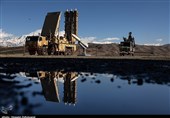Russia Preparing Patrols of Arctic Shipping Lanes
TEHRAN (Tasnim) - Russia’s military said it planned to sail regular naval patrols along shipping lanes in its territory in the Arctic Ocean that opened to commercial vessels only in the last few years, as Arctic ice began melting at a record pace.
The Ministry of Defense announced the move after a flotilla led by the flagship of the Russian Northern Fleet — the Pyotr Velikiy, or Peter the Great — completed a trip across the Arctic Ocean last week to great fanfare at home, where the news media presented the voyage as an example of Russia’s proud naval heritage.
The ship sailed through most of the once fabled Northeast Passage, a voyage that the military said Saturday marked the start of regular patrols to protect the thousands of miles of coastline suddenly open to other countries’ ships on a regular basis,The New York Times reported.
Russian leaders announced several years ago that the country would beef up its military presence in the waters to deal with what it considered a new threat, including from drug smugglers and illegal migrants who can now reach its northern shores during the warmest months of the year.
James Collins, a former American ambassador to Russia, said the new patrols were logical. “This is the Russian coastline, after all,” he said. “There isn’t anybody else going to look after it.”
But the earlier announcement about naval patrols had raised some concerns in other nations hoping to stake claims to nearby resource-rich waters, beyond the shipping lanes that fall within Russia’s “exclusive economic zone.” They worry about any military buildup near newly ice-free waters beyond that zone that are being disputed.
Disquiet over the Russians’ possible intentions in the Arctic have mounted since 2007, when a Russian expedition used a nuclear icebreaker and a minisubmarine to set a titanium flag on the seabed under the North Pole, which is well beyond what the world currently recognizes as Russia’s economic zone. That move looked to other Arctic nations like the first move in a grab for resources, although Russia said it was a scientific expedition.
Deciding who is entitled to the oil riches below disputed Arctic waters is expected to take years, and it will be based in part on complicated scientific findings about where various countries’ continental shelves end. Those findings help determine how far a country’s claims to resources under the seabed can extend.
Climate change has already had a profound effect in the Arctic. Just three years after the first commercial crossing in 2009, 46 ships sailed the route last year, which had the warmest summer on record in the Arctic. About 400 vessels are expected to cross this season.





